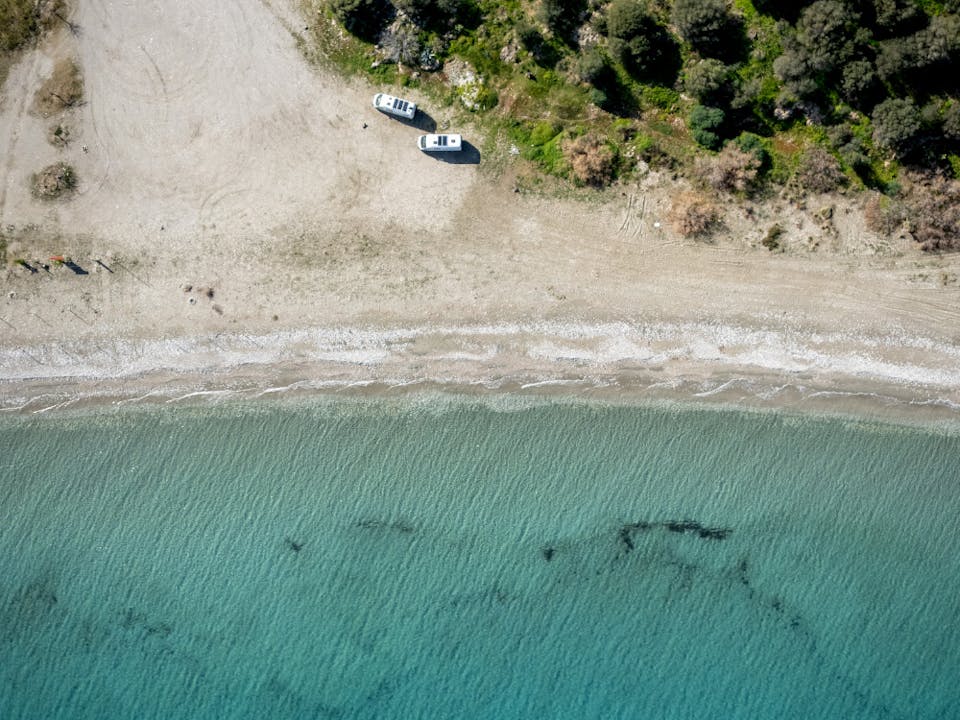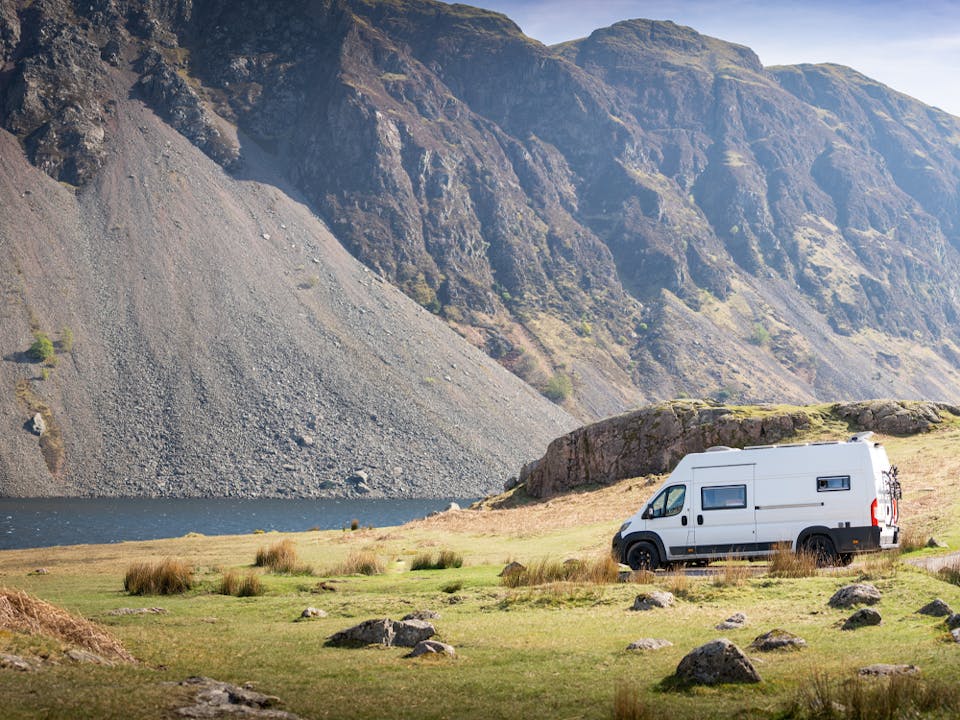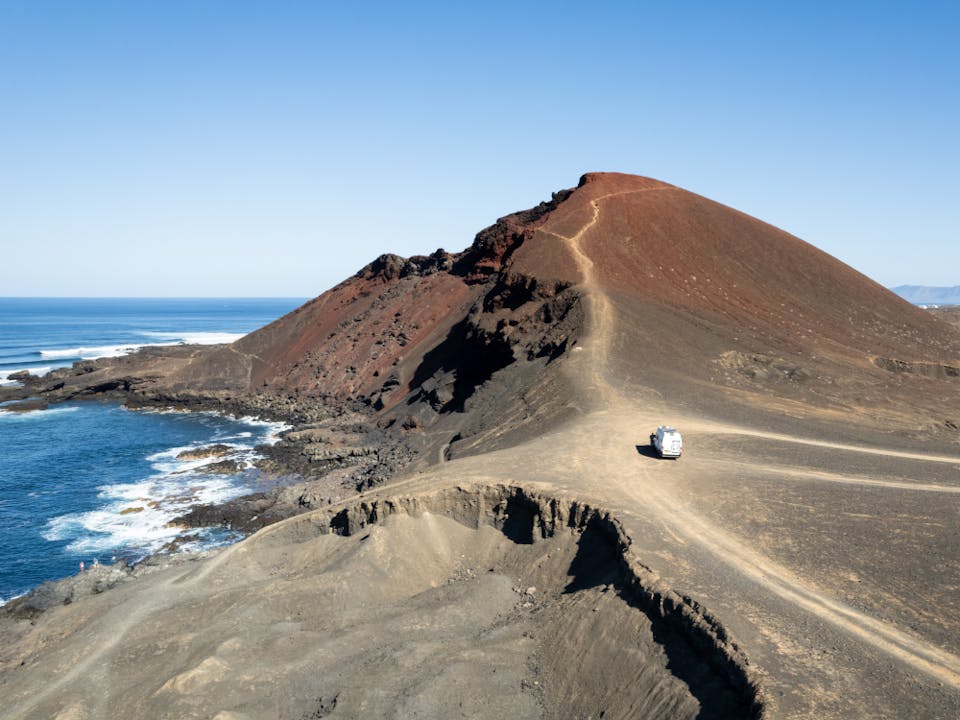
The ultimate vanlife FAQs
Answers to the most popular questions we see and receive about vanlife. From the logistics of living in a van to costs and how we find places to park. We've tried to answer the main questions to help you on your path to vanlife. We hope you find the below FAQs useful and if you think we're missing something - get in touch.
What is vanlife?
To us, vanlife is a form of nomadic lifestyle. Our Peugeot Boxer van is our home and we travel freely from place to place with no additional ties or commitments to a permanent base. Some people also refer to this lifestyle as overlanding which can also include multiple other vehicle types.
Why would you want to live in a van?
We chose to live in a van for a multitude of reasons, these reasons will be different for each individual but personally, it was to allow us the freedom to travel, explore and immerse ourselves in different cultures, instead of being restricted to being within a certain travel time or distance to our home or base. We can now move between places and countries at our own pace without restriction. We also get to enjoy full time travel with our dogs which was not possible for traditional international travel/flights etc. Living with less and learning to appreciate what you do have is also an important factor to us.
What van should I buy for vanlife?
Choosing a van can be a daunting task and different vans have different advantages and disadvantages. To pick your van you should into account a few main criteria: Age, bodywork, budget, height, width, and length. Traditionally a newer van with fewer miles on the clock would tend to be a better investment for a long term build, but this also will increase the price. Body work can also be important consideration as you might find a newer vehicle with less mileage but with issues in the bodywork or rust which could lead to additional expense and repairs down the road. For the dimensions, you need to think about where and how you want to live. Do you need to find it in a single bay in a car park? Do you tend to drive down very narrow and windy roads etc. Despite providing more space to live in, longer and wider vans will incur additional costs when catching ferries and potentially paying twice for parking spaces. We found a balance of the above on the L4 H3 Peugeot boxer. You can find out more about why we chose the Peugeot Boxer here.
How do you make money living in a van?
People live in vans for different reasons and with different financial situations. Because we decided that living nomadically was a long term plan for us we work on the road to keep our travels sustainable. We didn't like the thought of taking a sabbatical/gap year and having a finite amount of time to travel and explore. We have built our lives around working a consistent 3 days a week in order to finance our travels, whilst also allowing us more time in the week to explore and experience our surroundings. We've put together a post that talks more about our jobs and finances - Working from the van as digital nomads.
Where do you register your van when living in it full time?
Living in a van full time with no fixed address can bring a few logistical challenges but non that can't be overcome. Your bank, van insurance, registration and even your GP will need to have a registered address for you. For most people, they are able to register themselves to a friend or family address. Another tip is to choose products and services that are better served to moving around. Online only banks, paperless services etc. You can also use PO boxes or mail forwarding and scanning companies for post when living on the road.
How do you keep warm living in a van?
We use a Truma 6De combi boiler in our van. This unit has a 10l hot water tank and heating vents that go to multiple areas of the van. The advantage of a diesel heater like this is that you can turn it on with a thermostat and leave it running, just like you would in a house with your radiators. The Truma takes around 30 minutes to make hot water and there is an eco setting for 40 degrees and a high mode which brings the water to 60 degrees. We tend to only use the hot water for showers rather than having this on all the time. Because the overall volume is small in a van the heating is very efficient and takes diesel from our main tank so there is no additional duel supply or maintenance needed. We love how cosy the van is, and with this heating system we are never cold inside, even when living in snow or the mountains.
How do you shower living in a van?
When designing our build a separate toilet and shower room was high on the priorities. For full time living and primarily living off grid we wanted to be as self-sufficient as possible. We fitted an indoor shower and an outdoor shower to our van, both of which run off a Truma boiler which provides us 10l of hot water at a time. We use vegan shampoo bars which contain no nasty chemicals to ensure our grey waste is also free of contaminants. If living in a smaller van or a van without a shower there are some alternative ways to keep clean. You can boil the kettle and sink wash, check into a campsite, find a local beach with outdoor fresh water showers, use local gyms or swimming pools, visit family or friends, use a service stations/truck stop and even find cheap hotels or hostels.
Where do you go to the toilet living in a van?
We built our van for living off grid so including a toilet that felt as similar to a conventional toilet was important for us. After much research, we settled on a Natures Head waterless separating/compost toilet. Unlike traditional motorhome and camping chemical toilets, the composting toilets separate your liquids and solids, and can be used chemical free. A big advantage of this style of toilet is mitigating the reliance on specific black waste emptying points or having to check into campsites every few days to empty the toilet. They are also much better for the environment. With 2 people living full time we normally empty our liquids every 2 days and the solids tank will last around 3 weeks. Each time we empty the liquids we pour an inch of white vinegar into the tank to keep it clean and stop any potential smells. The toilet itself has a large moulded seat, a fan for venting and a crank for stirring and aggregating the solids. These are all features that some of the cheaper options or homemade style toilets might not have. We absolutely love our toilet and would buy it again without any hesitation.
Where do you get water living in a van?
We've found a variety of ways to get water whilst living in our van in the UK and all over Europe. Our van has an 80 litre tank underneath which we fill from a hose adapter. We also carry a Lifesaver Jerrycan which holds an additional 18 litres. This system acts as a purifier and filtration system which we use when we don't trust the water source going into the main tank. Whilst living in the UK we just drank straight from the underslung tank with a small inline whale filter and have never had issues. Some of the most common ways to top up water are: Campsites, Motorhome service points, Aires, Petrol stations, Industrial estates, Roadside taps, asking small businesses when you see an outside tap, Friends or family. It's worth carrying a variety of hose adapters and solutions as you never know what tap of diameter tap/threaded/non threaded etc you'll find.
How do you do laundry living in a van?
We normally have to do laundry every 3 weeks depending on the weather and what we've been up to or wearing. We rely on laundry services or unserviced machines to wash and dry our clothes. In the UK and Ireland we were often using Revolution laundry which are self-serve washing machines and tumble dryers which you can pay for on your phone or bank card. Whilst in Europe we look for self-service laundry's in towns or villages. We prefer the self-serve as they tend to be cheaper and you can get in and out within an hour to two. We also always carry a spare set of bedding so we can rotate between sets. Unlike the washing machines and tumble dryer you might have in a house, laundry services use commercial grade machines so the whole process is far less time consuming.
How do you get internet in a van or motorhome?
Getting access to the internet can actually be cheaper and easier than getting WiFi setup in a house. There are multiple ways to stay connected to the internet whilst travelling. The most popular options include tethering or using your existing phone and contract as a personal hotspot or using a mobile router (MiFI) device which contains its own SIM and creates a WiFi network. There are lots of options in terms of SIMs and data packages depending if you plan to be part or fulltime, in the UK or travelling Europe. We've written more indepth about this topic in a separate posts.
WiFi for your Motorhome or Campervan.
Mobile Hotspot vs MiFi vs Starlink for Vanlife.
The best internet for vanlife and digital nomads.
Can I live in a van with a dog or cat?
Yes! Absolutely you can. We live in our van with 2 dogs and have met many other vanlifers who travel with dogs and cats. We've even seen the odd ferret or bird too. Like living in a house with pets you have to ensure you create a safe and appropriate space for them to live. Temperature and security are also very important to consider depending on where you plan to live or travel. Our dogs have a better life now than they ever had when we lived in one place. They get to experience beaches, woods, mountains and snow as we move from place to place. We put together a fairly comprehensive post on Living vanlife with dogs and also Getting EU Pet Passports Post Brexit.
How, and what do you cook living in a van?
When it comes to eating, living in a van can be the same as a house. Sure there is a little bit less counter top to prepare and serve food, the fridge will be smaller and the oven might not be as efficient but there isn't much you can't do. We use a Thetford Triplex for cooking. It is a small 2 shelf gas oven and 3 burner hob which allows us to cook any dishes we want. We also use an Omnia stovetop oven for baking or if we need additional 'oven' style cooking. The Omnia is a great product if you only have a camping stove or gas burners without a physical oven. We also ensured we have a big sink for washing up afterwards.
How or where do you get post delivered when living in a van?
Getting post and deliveries can sometimes be a bit of a challenge whilst living nomadically but there is always a way. Some of the best ways we've found for receiving post or parcels are: Sending them to a campsite, using unmanned delivery points like Amazon lockers, approaching local businesses and asking if they will sign for an item, using a hotel or Airbnb, using a post office, sending items to friends or family for collection or for them to forward them on. Whilst out in Greece we needed some items sent from the UK so we arranged delivery of those items to a UK family member and then arranged a FedX collection and had it sent to a local Greek laundry (with prior permission) to receive the parcel.
How do you find places to stay living in a van?
There are a number or ways to find places to stay in your campervan. Some of our preferred options are: Word of mouth/recommendations from other vanlifers, apps like 'Park4night' and 'Searchforsites', Google maps, Using clubs or services like 'The caravan and motorhome club', Facebook groups, Instagram and YouTube.
How do you find LPG?
We have an underslung 20l LPG tank which we use for cooking in the van. It provides gas to our Thetford Triplex oven and lasts around 3 months between refills. Whilst living in the UK we used an app called myLPG.eu to find garages and petrol stations that have LPG pumps available. Unfortunately, LPG is only getting more and more scarce in the UK and we often found that we would detour to find gas, only to find that the pump was out of service or had been removed. As soon as we left the UK LPG is extremely easy to find. We no longer use any form of map or applications as it seems almost every garage has it available. It is worth remembering that the UK and the rest of Europe use different adapters at the filling stations so you'll want to purchase some of these before hitting the ferry or channel tunnel. We purchased the 'UK Bayonet Gaslow Gasit Remote Filling Point European Travel LPG Adaptor Set' from a company called LPG Shop and have had no issues filling our tank or finding LPG abroad.
How do you find and meet other vanlifers on the road?
One of our favourite things about documenting our travels via Instagram is that it has allowed us to connect with lots of other like-minded individuals from all over the world. Being part of an online community is a great way to learn and research areas, as well as seeing who might be in a similar location around you. We've met several groups after messaging on Instagram. We even ended up travelling for 2 1/2 months with a couple we met in Greece. If you're in the UK and are looking to meet up with other vanlifers we would highly suggest going to van events like Vanlife Fest, Vanlife Eats Big Picnic, Vanlove Fest, Camp Quirky and many of the other annual get togethers. If you use apps like Park4night to choose your locations you'll naturally find and bump into people as you travel as most people are using the same spots.
Is vanlife for me?
Only you can answer this question, but there are a few ways to understand if you'd like to do vanlife. If you already have a van or motorhome we'd highly suggest planning some long trips, and not just in fair weather. Get out and explore and see how you get on living and travelling in different environments, and also in a small space. If you've not dived into a van or motorhome purchase yet but are considering it, perhaps hire one a couple of times to see what you like and don't like. We also suggest attending campervan, motorhome or overlanding shows. If you're based in the UK these events normally start around the end of April and run until August/September over various locations. Van shows and events are a great way to meet and see other vanlifers. You'll be able to understand different layouts, models, specifications and also meet a diverse range of people. Quite often there are also talks and workshops at events which could give you all the information you need in order you make your own mind up. We personally came away from Vanlife Eats Big Picnic in 2021 deciding that we were going to take the leap and go fulltime. We were inspired by other peoples travels and decided it was only ourselves stopping the process.
How do you store clothes living in a van?
We have a couple of different areas where we store clothes in van and split these spaces evenly between the two of us. Behind our driving seat on the back of the shower wall we have several hooks which we use as day to day storage for coats, jumpers, jackets etc. We rotate what is stored here based on where we are, and the climate.
Above our fridge we have a wardrobe which is the right height to hang jackets and shirts. We tend to use this space for storing the items we aren’t using day to day, like waterproof coats, down jackets and also some of our ‘smarter’ clothes like trousers, shirts and dresses.
At the foot of our bed we have a cupboard each. This is where the majority of our clothes are stored. We use a mix of packing cubes, storage bags and soft boxes to separate and store clothes in these. We found it’s easier to store clothes by type and in a box or bag so you can easily access different items quickly and without having to empty everything.
Our final storage is a box in the garage which is where we store shoes and boots. Like the hooks at the front of the van we rotate what footwear is easily accessible depending on where we are, and what we are doing day to day. We also store specific sports items like wetsuits and accessories in boxes inside the garage.
Is living in a van safe?
There are lots of factors that dictate day to day safety and security when living in a van. Always moving between locations means you’ll often find yourself in places which are unfamiliar to you. Some of the ways we keep ourselves, and the van safe are; additional deadlocks on all of our doors, an alarm system, an aftermarket van immobiliser, security cameras, a tracker system. For keeping the dogs safe we also have the ability to monitor the inside and outside temperatures and receive alerts to our phone if it’s getting too hot in the van. We’d strongly advise having a permanent WiFi connection inside your van which can give you remote access to additional sensors, cameras and location information.
What do I need to drive outside of the UK?
If you plan on taking your van into Europe there are a few additional rules and equipment that you'll need to purchase in advance. For many EU countries, you will be required to carry items such as a reflective jacket for each person in the vehicle and a warning triangle. It is also beneficial to carry a breathalyzer but bare in mind these expire so will need to be updated. You'll also need a UK car sticker and headlight converter stickers at a minimum. Always check with your insurance whether you are covered to travel in the EU, the level of cover and how many days you will be covered for. We also suggest taking out an EU breakdown policy. When crossing borders you will often be asked for proof of insurance and your vehicles V5 document. Some places you might want to visit could also have restrictions on the types of tyres and chain requirements depending on the season. For the most relevant and upto date advice check the government website of the country/countries that you plan to visit.
For a closer look at our van, check out the van tour below.



